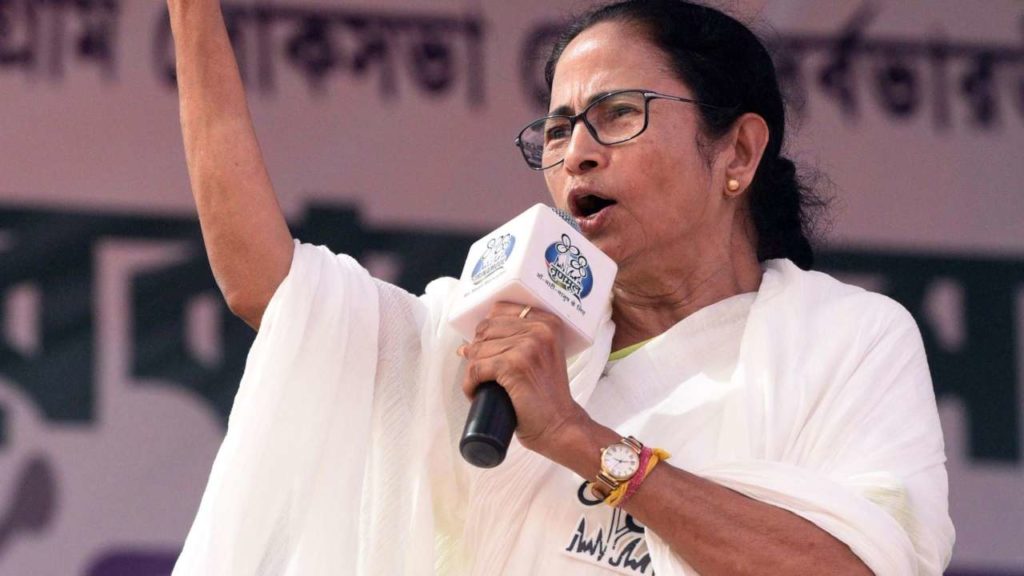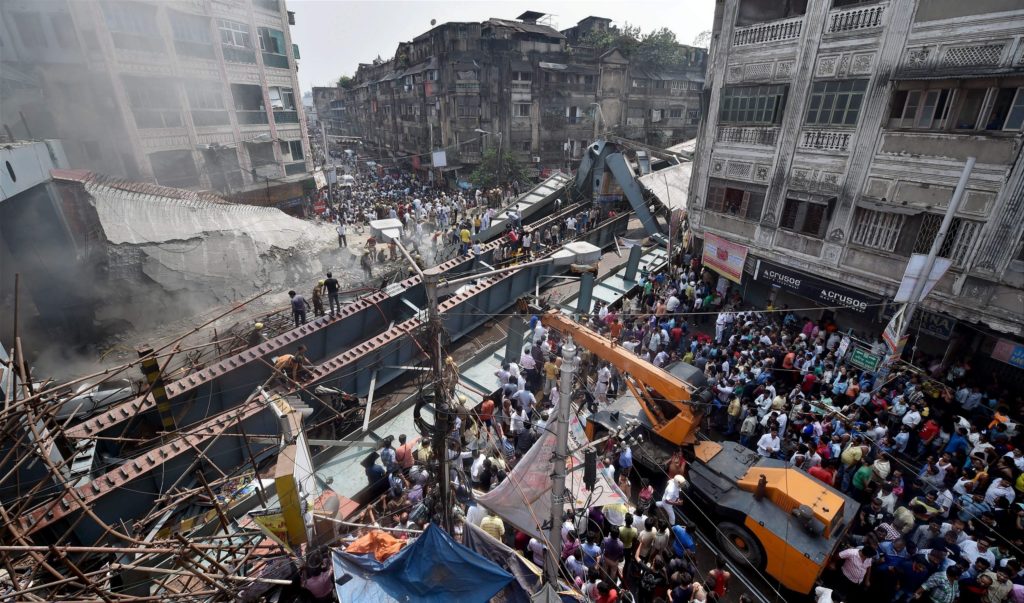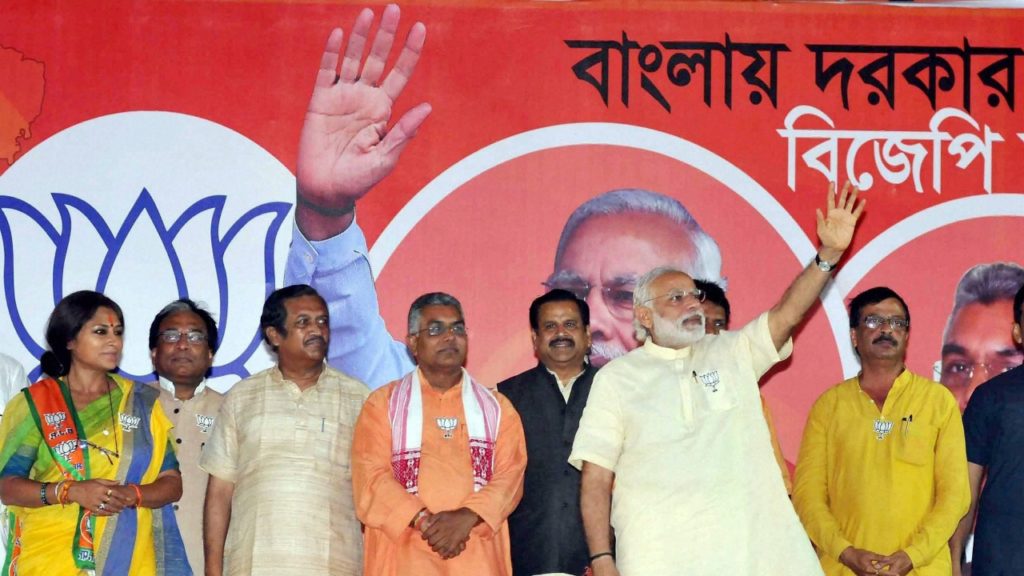
West Bengal has had for long a volatile political history. With several instances of mass-scale rebellions and violent uprisings against the administration throughout expansive swathes of time, the state has certainly enough potent to be labeled tempestuous. After a spate of gross misuse of power and unabated killings (Sainbari murders, Marichjhapi massacres, Nandigram) for a period of thirty-four years, Mamata ascended to the center-stage of West Bengal politics as the Chief Minister in 2011. Her party, the Trinamool Congress, had ridden to power through the catchphrase, ‘Maa Mati Manush’– promising people development (‘
Almost eight years later, the ground reality looks immensely far-fetched from the poll planks of 2011, and murders have once again reclaimed their spot as a political weapon.
Venomous Roots
Mamata has always been a mile away from the bhadralok-zamindar politics of the state; her repute as a militant street-fighter battling for the oppressed and destitute propelled her popularity among the masses. After assuming office, it only metamorphosed into a brand of politics that encapsulated populism, outreach efforts, and loyalty-garnering initiatives. There is no denying that in terms of social ventures, Banerjee has outdone most other politicians of her era; providing opportunities for the girl child (Kanyashree), and offering artisans, craftsman, and folk singers appreciable remunerations for their services. These activities have helped generate an army of party loyalists- being the beneficiaries to the government’s social schemes, these men had a call of obligation. Her party’s base continued to grow naturally until it hit the saturation point. And that is precisely when the trouble started.
With growing support and
Political greed, coupled with the onset of deplorable complacency, also opened the floodgates for corruption. The Narada sting operation revealed how 11 of her ministers accepted bribes in exchange of unofficial favors for a fake consultancy firm floated by the whistleblower himself. The Saradha scam mired her repute as a leader who takes on corruption- and suicide figures for those who lost all in the ponzi scam reached double digits. Despite such brutal revelations, she miserably failed to take any definite action against the
Appeasement Politics and Support Banks
Prior to Independence, the Muslim population in Bengal was estimated at 29.5%. Post partition, however, that figure dropped to 19.85%. However, after the 1971 Indo-Pakistan war and establishment of Bangladesh (formerly East Pakistan), the percentage again ricocheted to 20.46%. When Banerjee came to don the hat as a Chief Minister, the demographics resembled a 27% share of the Muslim
Sensing an opportunity to lap up the Muslim vote (an electorally significant 27%), the TMC supremo went all guns blazing to provide Muslims with benefits unparalleled. Her brand of appeasement politics is nowhere near subtle; her extravaganza in terms of playing the religion card is downright offensive. Calcuttans have got used to the sight of Mamata draped in a white scarf over her head offering namaz prayers during prominent Muslim festivities. The Dinajpur-Maldah-Murshidabad-Birbhum region has seen specific religion targeted efforts to win over the vote bank. However, such concerted effort towards minority appeasement has weaned off many. In 2016, Firhad Hakim, one of Mamata’s many trusted lieutenants, reportedly described Garden Reach as “mini-Pakistan”. A feature report by THG highlights how in the Falta block of South 24 Parganas, the alleged ‘monstrosity’ of TMC leader Zahangir Khan has accentuated the TMC’s rootless politics. This year, she increased the Eid bonus for all Muslim State employees to Rs. 4000, a 11% hike from last year.
Mamata has one trick up her sleeve that yields her big results: fielding celebrities! It seems to serve two objectives at once: while the stars bring along their own fan following to the advantage of the party, it also helps push party factionalism under the carpet. To take on the BJP’s Asansol candidate, Babul Supriyo, Banerjee placed yesteryear actress Moon Moon Sen as a contestant for the seat. Nusrat Jahan and Mimi Chakraborty, two eminent actresses from Bengal’s film industry, also found a place amongst the 42 prospective MP candidates, contesting the elections from Basirhat and Jadavpur, respectively. Tollywood star Dev Adhikari, one of the industry’s leading figures today (how pathetic!) is also in the fray this time around, from Ghatal. While the strategy is a complete winner in the short term, applying band-aid fixes to rifts within the party ultimately produces defectors, or worse, moles.
For residents of Kolkata and its suburban areas, the anarchy of auto-wallahs is beyond grasp. The auto drivers and toto (e-rickshaw) operators have pacts with local leaders in exchange of uninterrupted ‘do-what-you-may’ regime. Cases of road rage against such people are shelved by the police; in short, their supremacy on the roads remain unchallenged under the patronage of their political masters. Hawker encroachment, also allegedly under the patronage of local leaders, has rendered the wide majority of pavements inaccessible to pedestrians, exposing them to the perils of walking on busy roads at peak hours. These pacts are nothing but purely based out of monetary and vote considerations. As police action is de-facto forbidden, they continue their reign of pandemonium unfettered- and drop the votes alongside.
Industry Aversion and Syndicate Raj
Banerjee’s breakthrough moment in Bengal’s tense political environment was when she single-handedly spearheaded a campaign to drive out the TATA Group from Singur, alleging forced encroachment of farmer’s lands by the CPI(M) government. Her relentless protest ultimately ensured that the Nano project withdrew from Singur, marking a thumping win for her against adversities. Co-incidentally, as fate would have it, a marked decline in industrialization has been the jinx in her term as the Chief Minister.
In her first stint (2011-2016), the contribution of industry in West Bengal’s GSDP shrank from 19.1% in 2012 to 18.8% in 2013. Manufacturing also witnessed a progressive decline from 56% in 2012 to 55.3% in 2013. A report by the Business Standard in 2013 also highlighted a 97% decline in industries since 2010, and an 85% fall when compared to 2011. Since then, efforts were made to salvage Bengal’s flailing economy. The Global Bengal Summit was conceptualized in 2014 and has since been instrumental in attracting investment proposals into the state. In fact, in 2019 itself, the 5th Global Bengal Summit generated investment proposals worth Rs. 2.84 trillion. However, when it comes to implementation, the statistics are no longer rosy as they were on paper: growth and industry expansion is happening at an extremely tardy pace. Bengal has also squandered the opportunity of riding the demographic dividend, i.e. to cash in on the productivity of the working age population, a report from the UNFPA suggests.
The problem is multi-pronged and poses as a conundrum to the political dispensation. If the INTTUC (the party’s trade union arm) is to be strengthened, it will help bolster party recruits and drive support for the party. However, a strong trade union would also ride roughshod over the managerial decisions, and any complications would keep further investor interest at bay. So far, the Trinamool Congress has not been able to find a viable solution to this stumbling block on the road to development.

In cities, however, the problem assumes a radically different dynamic. Construction land, building materials, and sand are all controlled by a group of people who remain politically affiliated to the ruling party- termed as syndicates. Extortionism is common, and any buyer who seeks legitimate means of transactions would be compelled to ‘give in, or give up’. Often, these syndicates provide an inferior quality of construction materials at a higher price, widening their pockets with profits. This has inadvertent effects. Repair work done by the State’s Public Works Department turns out to be temporary and inadequate. In 2016, a flyover collapsed over Girish Park- a crowded locality in Kolkata, with later inspections revealing the supply of inferior-grade materials as one of the chief reasons for structural instability.
Rise of the Right Wing

Amidst an atmosphere of uncertainty, the biggest gainer has undoubtedly been the Bharatiya Janata Party. Drawing from its proven formula of polarisation of voters along religious lines, the party primarily projected itself as a binary alternative to Mamata’s Muslim-first policies. It had all the positives in the world to begin its journey with:
- The party effectively relied on Modi’s mass appeal, particularly among the youth of the state- promising ‘
sabka saath ,sabka vikaas ‘ (inclusive development for all). - The Left, which was completely routed in the 2019 Lok Sabha elections, had its entire vote base transferred to the BJP, and,
- The theme of national security and an unprecedented influx of illegal Bangladeshi immigrants into Bengal were repeatedly underscored to rake up jingoistic sentiments.
The Bharatiya Janata Party, which had no significance in Bengal’s poll map, has made a surprising wildcard entry to play an integral role in the complex workings of the State’s politics. It will be interesting to observe how the right-wing, which focuses on the base of Hindutva, fares in a state where Muslims form a significant chunk of the population. Furthermore, the electorate expects the BJP to make the paradigm shift and ensure policy changes, to facilitate rapid industrialization of the state. While Modi’s Gujarat model is easy to sell as an ideal model, Bengal is not Gujarat: the state arm of the BJP will face tough challenges in its quest for
The Way Forward
Bengal’s explosive mix of greedy politics, minority appeasement and populism is certainly a disaster waiting to happen. Political violence is on the consistent rise. The Panchayat polls in 2018 were one of the bloodiest in Bengal’s history, with 25 people being slain as part of political rivalry. Post-poll violence after the 2019 Lok Sabha elections is so bad that an imposition of President’s Rule is being pondered over as an option to tackle the absolute lawlessness that Bengal is reeling from today.
The fantastic irony lies in the fact that a leader who comes from a background of fighting against heavy-handed establishments, has herself succumbed to the vagaries of electoral rapacity! Under Mamata’s regime, ‘red fascism’ of the Left has merely been replaced by secular fascism, and the Trinamool Congress is essentially old wine served in a new bottle.
To begin with, Mamata must have a hard look at her own policies- often crafted with vested interests- and alter them at the earliest. Second, she must look to fill bureaucracy with competent officers, and not puppets: it will ensure that she gets sound advice on critical issues pertaining to efficient governance. Third, she must reign in lumpen elements operating from within the party, as a party with leaders who are mutually out of sync damages both the party as well as good governance. Fourth, she must make a dedicated effort to stop the syndicate raj and illegal sand mining that rot the State machinery, as her silence only fuels such activities. While her party stands to lose significant amounts of donation amounts coming from such illegal syndicates, she would be free of the moral guilt, and more importantly, the taint of giving a free hand to such elements. Fifth, and most importantly, it is time that she introspects the demographic damage that minority appeasement is doing to West Bengal’s cultural lineage. State security, as well as an irreparable cultural heritage, should never be toyed with in a bid to polish vote banks.
At this hour of desperation, Mamata needs not only an image makeover but also an administrative rejig, to make things work for the TMC. I can only keep fingers crossed, and hope that sense prevails soon. It would be apt to recall Ellen Glasgow, the famed American novelist, who had prognosticated that “… all change is not growth, as all movement is not forward.” If only the Trinamool Congress could draw some lessons.
One of your best articles……indept analysis of Bengal political scenario. Your suggestions for improvement is the need of the hour which if implemented will change the course of Bengal politics
Masses suffer a lot when political issues try to crush them: the condition of Bengal . Truly,the need of the hour is that the situation is tackled tactfully as you mentioned . May your words spread the awakening!
Your best article. In depth analysis makes this an interesting read. Keeping fingers crossed so that this article raises awareness. May better sense prevail. The party needs to really work hard to regain lost grounds. & that seems remote with the level of arrogance
Minority appeasement policy has led to rise of BJP in Bengal.
Keep on writing articles like this.
God bless you